.jpg)
Advanced Research
9 Essential Questions for Evaluating Employee Satisfaction Software
February 20, 2026
Employee Research
Articles
.jpg)
Advanced Research
9 Essential Questions for Evaluating Employee Satisfaction Software
February 20, 2026
Employee Research
Articles

Advanced Research
How to Evaluate Market Research Vendors for Global Reach
Team Remesh
February 10, 2026
Market Research
Articles

Advanced Research
How to Evaluate Market Research Vendors for Global Reach
Team Remesh
February 10, 2026
Market Research
Articles

Advanced Research
3 Early-Stage Research Methods to Gather Consumer Insights
Team Remesh
January 27, 2026
Market Research
Articles

Advanced Research
3 Early-Stage Research Methods to Gather Consumer Insights
Team Remesh
January 27, 2026
Market Research
Articles
.avif)
Advanced Research
Why Agencies Should Embrace AI Tools for Market Research
Team Remesh
January 26, 2026
Articles
.avif)
Advanced Research
Why Agencies Should Embrace AI Tools for Market Research
Team Remesh
January 26, 2026
Articles

Advanced Research
The Top Market Research Companies for the CPG Industry
Team Remesh
January 20, 2026
Market Research
Articles

Advanced Research
The Top Market Research Companies for the CPG Industry
Team Remesh
January 20, 2026
Market Research
Articles

Advanced Research
The Most Cutting-Edge Consumer Insights Software of 2026
Team Remesh
January 5, 2026
Market Research
Articles

Advanced Research
The Most Cutting-Edge Consumer Insights Software of 2026
Team Remesh
January 5, 2026
Market Research
Articles

Research 101
Introducing: Poll Comparison - Streamline Concept Testing and Make Better Decisions Faster
Emmet Hennessy
November 24, 2025
Market Research
Articles

Research 101
Introducing: Poll Comparison - Streamline Concept Testing and Make Better Decisions Faster
Emmet Hennessy
November 24, 2025
Market Research
Articles

AI
Purpose-Built for Research AI is Here - a Letter from the CPO
Jessica Dubin
October 21, 2025
Market Research
Articles

AI
Purpose-Built for Research AI is Here - a Letter from the CPO
Jessica Dubin
October 21, 2025
Market Research
Articles
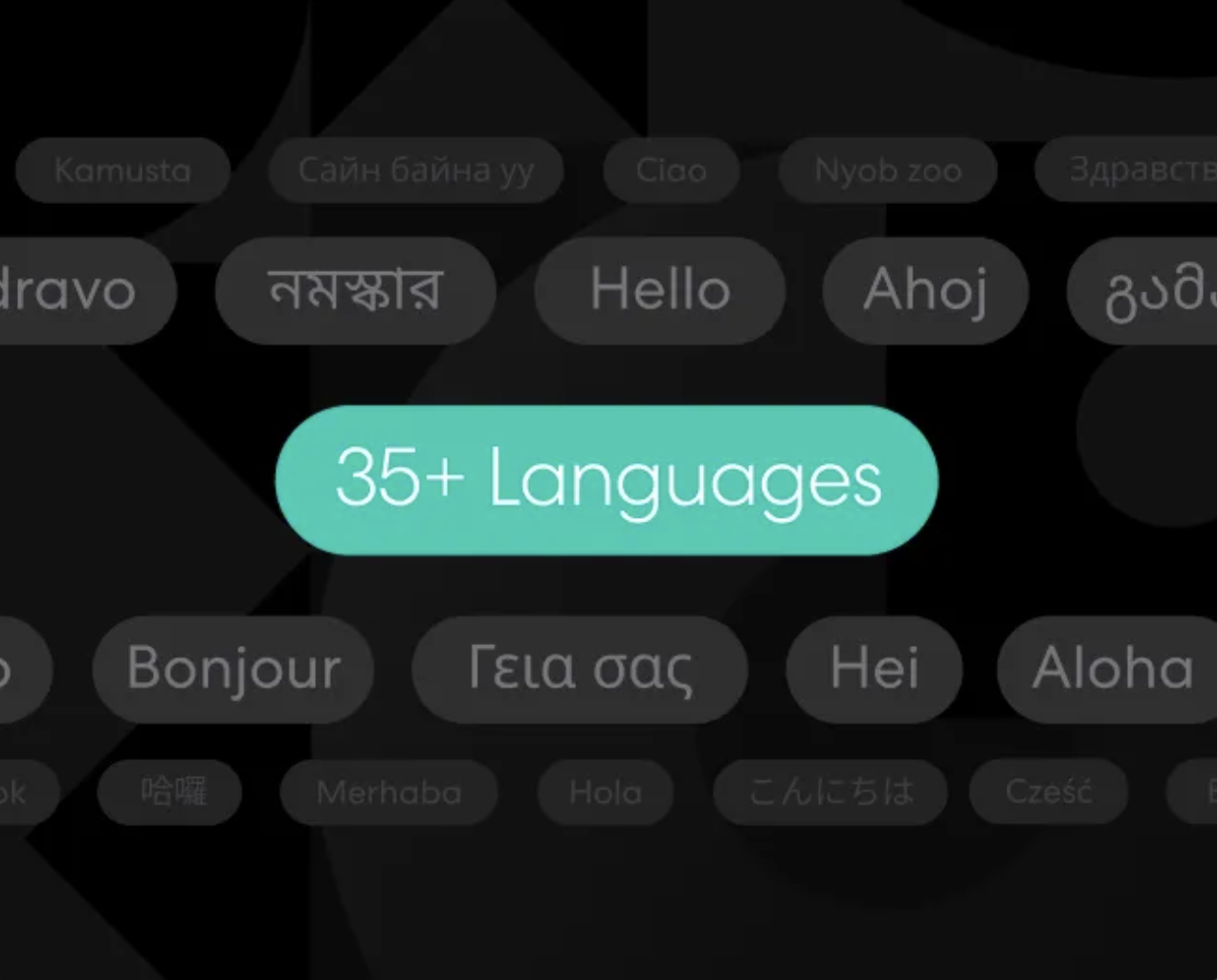
Advanced Research
Unlock Agile Global Insights: Using Remesh Multi-Language Conversations for Research Across Audiences
Customer Success Team
October 14, 2025
Market Research
Articles

Advanced Research
Unlock Agile Global Insights: Using Remesh Multi-Language Conversations for Research Across Audiences
Customer Success Team
October 14, 2025
Market Research
Articles
How and Where Remesh Uses AI in Market Research
Get insights into the responsible use of AI in market research. How Remesh's AI insights platform prioritizes safety, security, and trust.



Artificial Intelligence (AI) promises enhanced efficiency and groundbreaking insights. AI in market research is here, but many insights professionals are proceeding with caution — as they should.
Remesh is an AI insights platform, and we take the responsibility of using AI in our solutions very seriously. Here’s an overview of our core principles surrounding AI, how and where we use it in our platform, and answers to some of the top questions we get surrounding the technology.
Our Stance on AI in Market Research
We’re not new to AI. We’ve been using it for over a decade. And we’ve always prioritized safety, security, and trust.
Here are some of our guiding principles:
- We use AI responsibly, ethically, and thoughtfully.
- We believe AI technology is best used to help humans — not replace them.
- Data is never used to train or tune AI models.
- We guarantee that our clients retain ownership of their data.
- Generative AI outputs are not trusted blindly — human oversight is essential.
How Remesh Leverages AI
There’s trust in transparency. Here is an overview of our AI features and the technology that powers them.
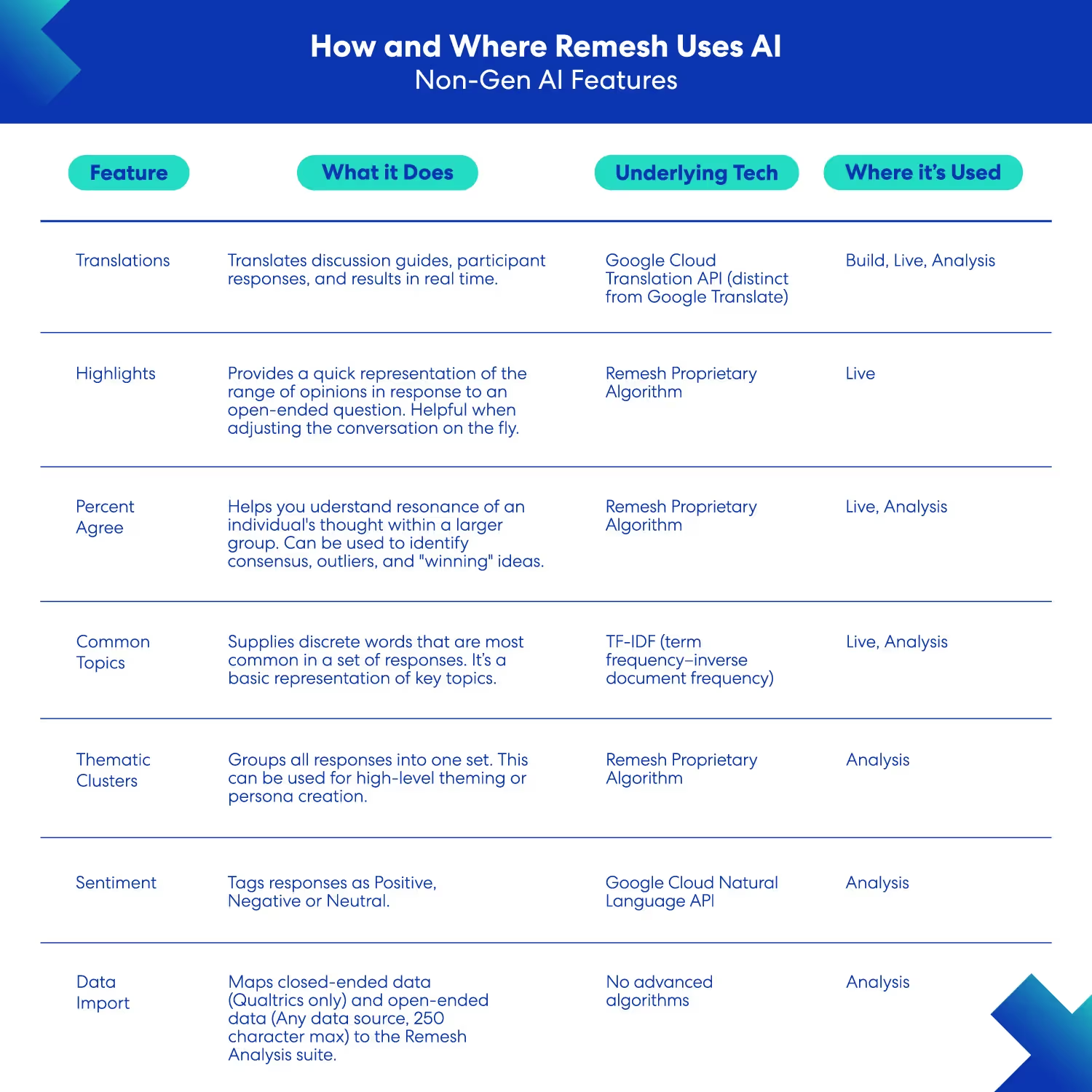
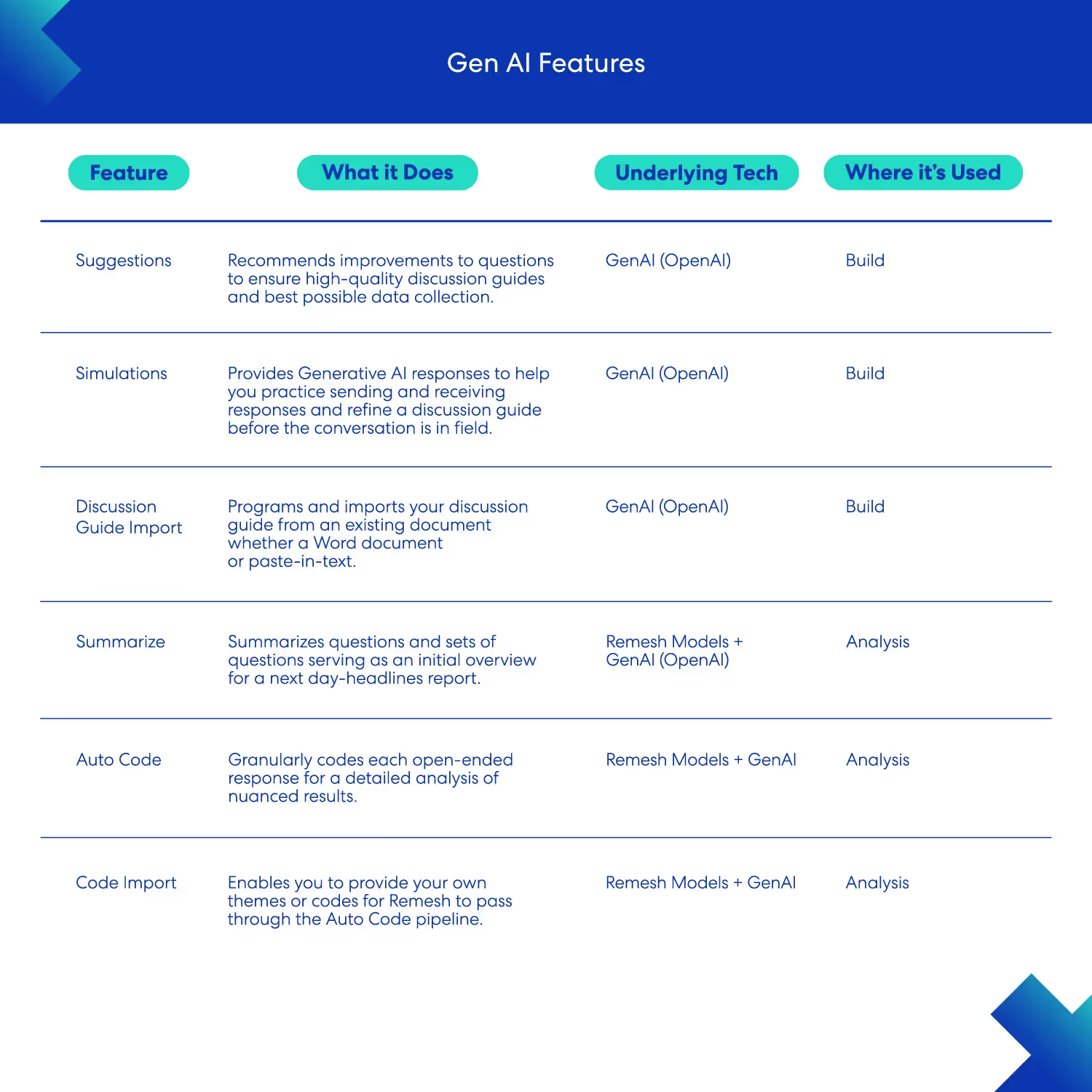
Remesh and AI: Frequently Asked Questions
How does Remesh keep my data safe?
At Remesh, ensuring the safety of your data is our top priority. With the advancement of AI technology, concerns about data privacy, security, and ownership have grown. Rest assured, we take these concerns seriously. While we've been utilizing AI for over a decade, the data is never used to train the model.
In addition, Remesh undergoes an annual third-party audit. This rigorous process includes a comprehensive Penetration Testing report and a SOC 2 Type II certification, affirming our adherence to the highest standards for security and privacy. These measures are part of our ongoing effort to safeguard your data and trust in our AI-powered solutions.
What makes Remesh’s use of AI distinct?
A lot of solutions on the market have quickly layered AI on top of their existing solutions.
Remesh has been purpose-built using AI from the beginning. We solve problems using the right technology in the right places, which is often (but not always) AI. And when we do use AI, we’re very intentional about ensuring that it doesn’t sacrifice the quality or integrity of your data.
Let’s talk Generative AI. When Remesh uses Gen AI technology, we aren’t simply adding ChatGPT and throwing our branding on top. Gen AI outputs are only as good as our inputs, and we refine and optimize the inputs, always putting you, the researcher, in total control.
Here are two specific examples that showcase Remesh’s unique take on Gen AI:
1. Summarize
There are a lot of Generative AI solutions that summarize text. They promise to deliver time savings, but they’re simply layering ChatGPT to produce summaries of your text. You could copy and paste that into ChatGPT yourself and achieve the same outcome. Remesh does things differently.
In a Remesh conversation, participants don’t just provide answers to questions. They also provide their level of agreement and preference to other participants’ replies. Only Remesh captures and organizes this data, which is all pre-processed by our algorithm, and results in highly nuanced, ultra-rich summaries that drastically jumpstart your research.
.avif)
2. Auto Code
Remesh is pioneering the use of AI in qualitative coding through our Auto Code feature. Whether you’re using inductive or deductive coding, AI shaves hundreds of hours of work into mere minutes by automatically assigning codes/tags to every open-ended response.
Again, we’re not simply feeding each response to ChatGPT and blindly trusting the outcome. We pre-process the data, check and refine the output, and give the researcher the ability to make any necessary changes.
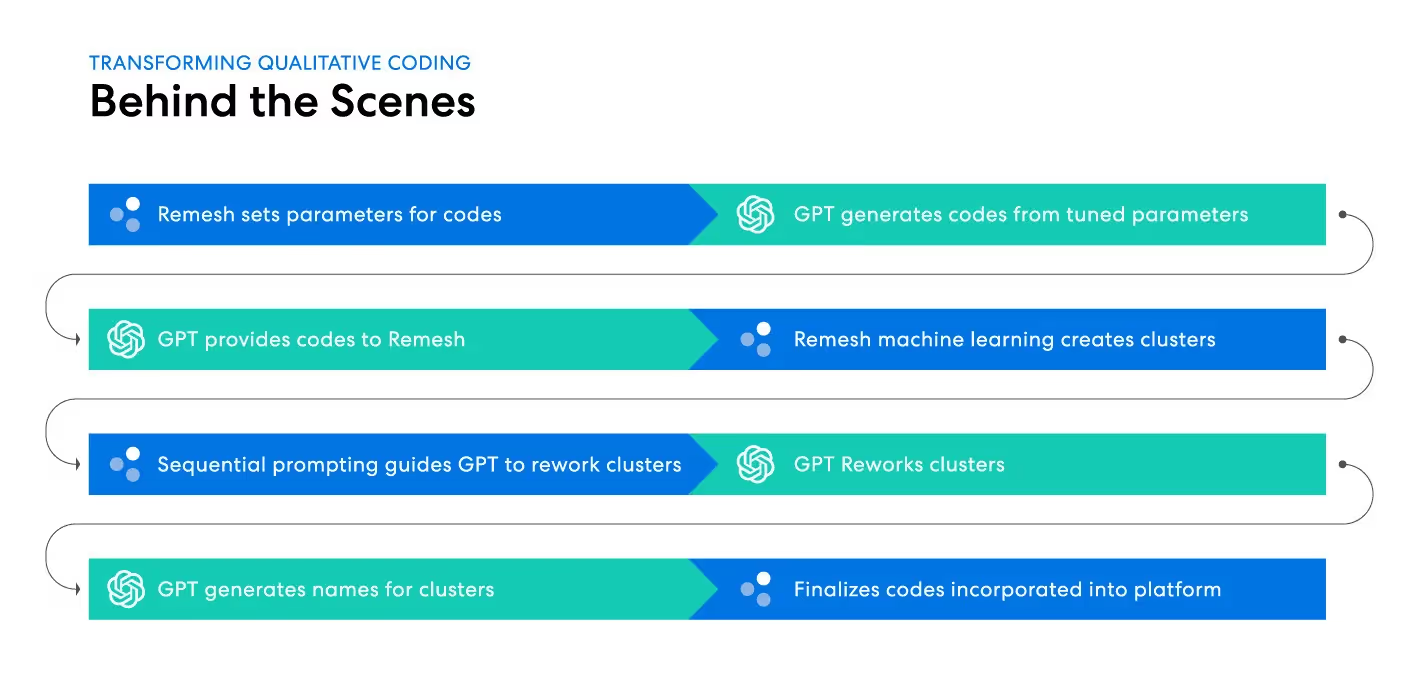
Our customers are impressed by how accurate Auto Code is and the vast time savings it provides. It’s truly changing the game of qualitative coding.
Can Generative AI features be turned off?
We only employ Generative AI when we feel confident that it maintains the integrity and security of our clients’ data. However, we understand that some of our clients still have apprehensions or policies that prevent them from using these features.
As the researcher, you’re always in full control. Generative AI features can be enabled and disabled by admins to customize your platform experience. You can even enable/disable Generative AI features at the team level, so you can grant access to only specific teams. This is helpful for enterprises and agencies who may serve clients with different policies on Generative AI.
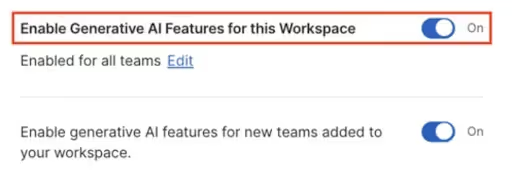
The Future of AI in Market Research
Will AI replace the need for humans in research?
No, AI will help humans achieve greater efficiencies, but it won’t replace them; at least not for the foreseeable future.
AI has a risk of inaccuracies and missing the key insight or application of that insight, and therefore the need for human oversight will remain. The opportunity lies in the increased efficiency of the “right” output that results from combining human expertise with the capabilities of AI and other powerful technologies.
Researchers are uniquely positioned to benefit from the increased capacity provided by the efficiency these new tools offer. This will enable them to dig deeper into the data, spend more time on outcomes and carry those outputs — including the ever-important why — further into and up into organizations.
For example, it can take researchers dozens of hours to sift through open-ended responses manually. With Summarize, that time can be drastically cut. While human oversight is still required to craft the insights and story that the findings reveal, the time savings allows researchers to spend more time on that story, resulting in better outcomes.
What are potential pitfalls tech companies and researchers need to consider when using generative AI technology?
1. Blind trust
The biggest temptation will be to have blind trust in the technology — to take the Generative AI outputs “as is” and accept them without question. This can lead to worse business outcomes.
Industry leaders that achieve the best business outcomes will use Generative AI responsibly, meaning they’ll use the results of a generative model as a starting point, not the finish line. We’ve heard from our customers using our Summarize feature that it’s important for them to see the underlying data that comprise the summaries. This transparency is key. Summaries are not insights. While Summarize provides researchers a head start, they still need the raw data to derive understanding and value. Complete transparency allows researchers to leverage their expertise with greater effectiveness.
2. Biased inputs that go unchecked
While Generative AI can generate highly coherent text, they don’t actually have any understanding of language. Their output is only as valuable as their inputs and their training data, and they can be biased if the data they are trained on isn’t objective. Given that they are trained on data from the web that is inherently biased, these models are inherently biased too.
When unchecked, this can be a big problem. Even without bad intention, biases and stereotypes could be reinforced. Misinformation can be presented as fact, and the effects of that can be far-reaching. This is why transparency and human oversight is so important. Ultimately, there’s a shared responsibility between research professionals and technology partners to remain informed of the potential bias in the models and put measures in place to both identify and address them. This includes complete transparency on how the AI model works.
Given the risks and limitations, why should organizations and researchers lean into this technology?
We’re living in a time of economic uncertainty, budget cuts, and shrinking timelines. The natural tendency during times like this is to cut corners and stop conducting research. This innovation changes that, because in a way it cuts corners and gets organizations speed to insights that can give them more certainty as they move forward.
Now more than ever, researchers and brands need to listen to and understand consumer and employee needs — and they need to get to actionable insights fast. The world is moving at lightning speed, and organizations that don’t keep up risk being left behind. Remesh gives you the best of both worlds — the ability to surpass your competition with AI but also the trusted oversight and years of review from the Remesh team.
As a technology partner, Remesh will continue to lean into AI technology and empower our customers to leverage it in a way that is ethical, safe, and hugely beneficial. We will continue to be open and transparent about how it is being used, and create an environment of continual feedback and open conversation as we grow together.
What’s next for AI in the insights industry?
AI has the potential to revolutionize the insights industry.
In the not-too-distant future, we expect to see Large Language Models (LLMs) involved in creating and initiating research projects. We will likely see LLMs helping to write proposals, write the actual research plans, and even recommend participant segments.
Ready to leverage AI in your research process?
Schedule a demo to explore how Remesh can help you solve research challenges and slash time to insights.
Please view our Privacy Policy and Terms of Service. Data is not used to train or tune any models. Please also review OpenAI’s Terms & Policies and specific API Data Usage Policies.
-
Lorem ipsum dolor sit amet, consectetur adipiscing elit. Suspendisse varius enim in eros elementum tristique. Duis cursus, mi quis viverra ornare, eros dolor interdum nulla, ut commodo diam libero vitae erat. Aenean faucibus nibh et justo cursus id rutrum lorem imperdiet. Nunc ut sem vitae risus tristique posuere.
-
Lorem ipsum dolor sit amet, consectetur adipiscing elit. Suspendisse varius enim in eros elementum tristique. Duis cursus, mi quis viverra ornare, eros dolor interdum nulla, ut commodo diam libero vitae erat. Aenean faucibus nibh et justo cursus id rutrum lorem imperdiet. Nunc ut sem vitae risus tristique posuere.
-
More
.jpg)


Stay up-to date.
Stay ahead of the curve. Get it all. Or get what suits you. Our 101 material is great if you’re used to working with an agency. Are you a seasoned pro? Sign up to receive just our advanced materials.

.png)

.png)

.png)
.png)





